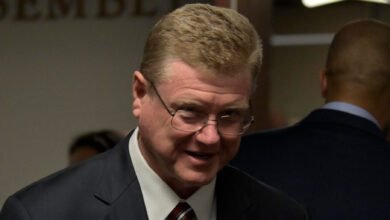The Democrats’ Midwestern charm offensive • Nevada Current

In the critical contest to appeal to swing-state voters in the Upper Midwest, the Kamala Harris campaign could not have come up with a better running mate than Minnesota Gov. Tim Walz if they made one in a lab.
At the Democrats’ love fest in Chicago, where speakers laid out their optimistic, inclusive vision of America, Walz played the Ode to Joy. Surrounded by a phalanx of paunchy ex-football players he used to coach, Walz was introduced by a former student who testified that “Tim Walz is the kind of the guy you can count on to push you out of a snowbank. I know this because Tim Walz pushed me out of a snowbank.” Whether he was teaching high school, passing universal free breakfast and lunch for Minnesota public school kids, delivering a casserole to a neighbor who just had a baby or taking on an extra coaching job to pay down the debt of a student who couldn’t afford lunch, Walz appears to have spent his life embodying the salt-of-the-earth Midwestern values of neighborliness, decency, hard work and common sense.
And then there’s the sheer exuberance of the man, beaming from the podium and shouting “woo!” as he looked across the convention crowd waving “Coach Walz” signs, hugging his children who were overcome with emotion. All of that is hard to fake.
Walz is a big problem for Republicans, who have positioned themselves as the real voice of working class, Midwestern voters.
In his speech accepting the Republican vice presidential nomination, J.D. Vance tapped into the “politics of resentment” in Wisconsin, talking about how global trade deals accelerated the decline of American manufacturing and left farmers scrambling to compete on the global commodities market. Those are real issues that drove white, working-class voters to Trump.
But Walz changes the game. As he put it in his speech, taking a jab at Yale Law School grad Vance, “I had 24 kids in my high school class and none of them went to Yale. But I’ll tell you what, growing up in a small town like that, you learn to take care of each other.”
Walz is calling the Republicans’ bluff. Vance, a former venture capitalist, and Trump, a billionaire real estate tycoon, are not genuine representatives of the working class, he says. And their “weird” policies — cutting taxes for billionaires, threatening social safety net programs and pursuing women across state lines if they seek an abortion — are not in line with mainstream American values, either.
Real small-town middle-American values include fairness, taking care of “your neighbors in need,” and the “gold rule: Mind your own damn business.” Those are not made-up notions. They have some deep cultural resonance.
Republicans have still not figured out how to deal with it.
Taking a detour to Milwaukee during the Chicago convention, Harris and Walz dunked on crowd-size-obsessed Republican presidential candidate Donald Trump by packing two stadiums at once — the United Center in Chicago, which was hosting the DNC, and the Fiserv Forum, site of the recently concluded Republican convention. At that event, Walz said, “You run a campaign based on fear like them, you’re going to run into a little trouble when you run into a campaign based on joy.”
Instead of deflecting the charge that he seems “too serious, maybe angry,” Vance recently responded to a reporter’s question about what makes him happy by snapping, “a lot of things, including bogus questions from the media,” and then pivoted to talk about more things that make him angry.
In Wisconsin, where presidential elections are won and lost by the smallest of margins, Trump and Vance have been pouring energy into trying to win over this closely divided state — by sticking to their divisive message. Recently Vance made trips to Milwaukee and Kenosha to accept the endorsements of local police, and to blame immigrants and the Biden administration for violent crime (which has gone down since Trump left office.)
“Leaders don’t spend all day insulting people and blaming others,” Walz said in his convention speech, before segueing into his “pep rally” talk: “It’s the fourth quarter. We’re down a field goal. But boy, do we have the right team.”
That light-hearted, optimistic spirit is a force to be reckoned with.
So is the message conveyed by the diversity on stage at the Democratic convention, seeking to make history by electing the first woman, a woman of color, president of the United States. In her speech Thursday night, Harris told her personal story as a daughter of immigrants who settled in a working-class neighborhood and who understood injustice and fought for civil rights. Throughout the convention, multiple speakers affirmed the contributions of immigrants at a time when new arrivals in this nation have been dangerously demonized, and which celebrated the first Black president and all the good feeling that still surrounds his time in office. To all of that good feeling, Walz added a key demographic — white men of the Upper Midwest. His message, that they are part of, not threatened by, the advancement of other Americans, is a powerful rebuttal of a Republican campaign fueled by white, male alienation and anger.
“In my neighborhood, we all wish that someone like that would run for office,” Benjamin Ingman, the student Walz pushed out of the snowbank, said of Walz.
A lot of other Midwesterners agree.
This column was originally published in the Wisconsin Examiner, which like Nevada Current is part of States Newsroom, a nonprofit news network supported by grants and a coalition of donors as a 501c(3) public charity.





